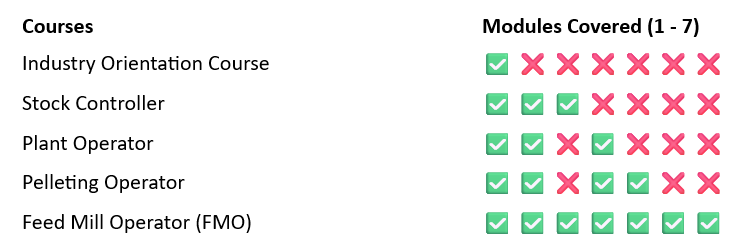End of Content.
End of Content.
The AFMA-endorsed Feed Mill Operator (FMO) Blended Learning Program equips feed mill staff with the knowledge and practical experience needed to thrive in South Africa’s modern feed manufacturing environment. When employees are well-trained, businesses perform better. Skilled operators are essential for producing safe, high-quality animal feed – consistently and efficiently. This program helps improve productivity, reduce downtime, support staff retention, and strengthen a culture of quality and safety.
Program Overview & Blended learning approach
The Feed Mill Operator (FMO) Blended Learning Program is designed to equip learners with both the knowledge and practical skills required to operate effectively in a livestock feed milling environment. Since its launch by AFMA in 2020, the program has grown steadily, with more than 160 feed mill operators trained across Southern Africa.
Developed tin partnership with Bühler and Learning Pathways, the course provides up-to-date training content aligned with the technical requirements of the feed industry, preparing learners to function confidently at an Operator level.
The program follows a blended learning model that combines:
Each participating feed mill acts as a site of learning and evaluation. Feed mill experts are trained as workplace coaches/facilitators, providing structured guidance and support to learners throughout the training process. These sessions follow a clearly defined coaching and competence evaluation framework.
This Workplace-based Integrated Learning (WIL) approach helps learners:
Learners are trained on-site, meaning production is not disrupted by long off-site courses, companies gain from learning and mentoring happening in the flow of daily work.
Program Structure
Whether you’re looking for comprehensive training or a focused skill development path, the FMO Blended Learning Program provides the knowledge and hands-on experience needed for success in the feed industry. The modules are grouped into two focus areas. Modules with common applicability in a feed milling environment (theory) and modules of a technical nature specifically related to the equipment and feed production processes (practical).
Learners can choose to enrol for the full program to qualify as a Feed Milling Operator (7 Modules), or for a shorter program to qualify either as a Stock Controller, Plant Operator, or Pelleting Operator (3 or 4 Modules). Each course includes a structured selection of modules tailored to specific job functions:

MODULES COVERED
Theory Modules: Delivered via a user-friendly platform, the theory modules keep learners engaged with multimedia content, assessments, and structured reporting:
Practical Modules: A train-the-trainer approach enables experienced FMOs to coach and assess learners in the workplace:
Program duration
Program Outcomes
By the end of the program, learners will be able to:
Admission Requirements
Register Below
Enquiries
Email: admin@afma.co.za
Contact: +27 012 663 9097
Note: To register more than three learners, please contact the AFMA Office at admin@afma.co.za
If you are registered on our database to submit your feed, salmonella and mycotoxin statistical information, you can login here.
If you are not able to access the Statistics System dashboard, please make contact with our admin team to verify your membership and access credentials.